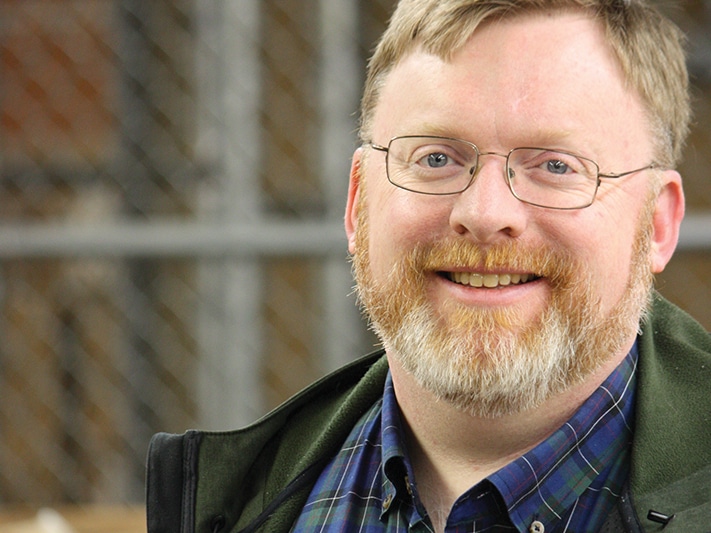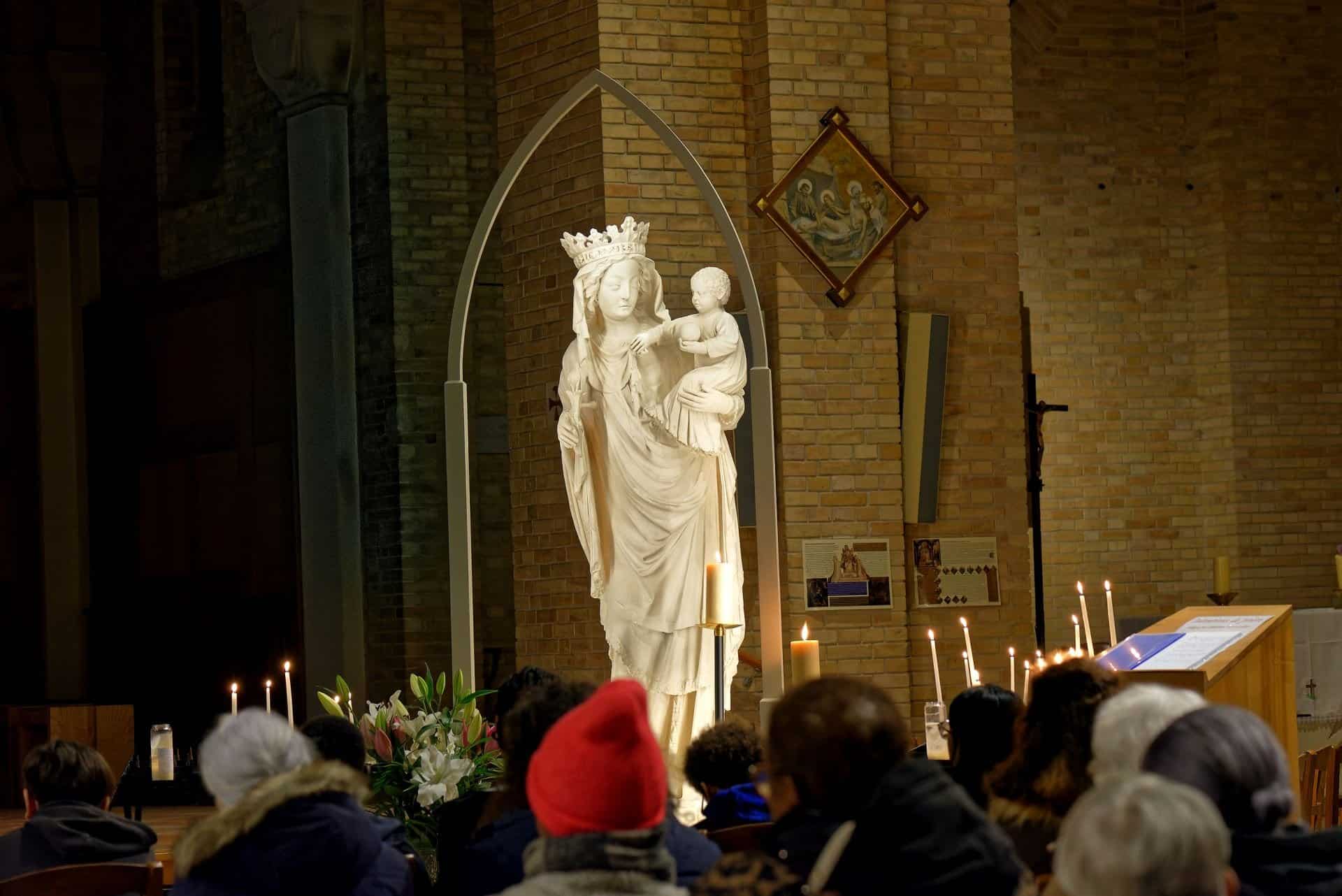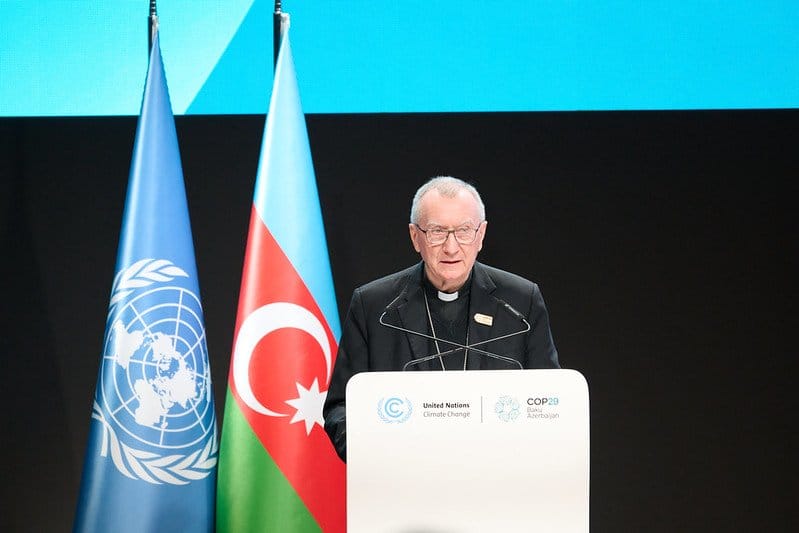Michael Vanderburgh is a people person. A self-described extrovert, he thrives on connection and communication with others, no matter what their backgrounds or particular station in life might be. Case in point: When Vanderburgh sat down with St. Anthony Messenger at a restaurant just outside of Dayton, Ohio, for the first of multiple interviews, he asked the waitress, “So, what’s good here? ” A warm smile formed on his face as the waitress recognized him from the previous week and, smiling herself, replied, “Oh, pretty much everything. ”
In various ways and in different capacities, Vanderburgh has spent his life building and nurturing relationships with people, and, extrovert that he is, he wouldn’t have it any other way.
However, Vanderburgh has every reason to have done just the opposite, to run away from people instead of toward them. When he was 12 years old, his world came crashing down as he became a target and victim of sexual abuse by a Catholic priest. As crushing and damaging as the abuse was to Vanderburgh’s soul and psyche, there was still room for God’s grace and mercy to accompany him in his suffering.
Poet and folk singer Leonard Cohen once wrote, “There is a crack in everything/That’s how the light gets in. ” Interestingly, Vanderburgh recites a short prayer every morning that is strikingly similar in spirit: “Lord, take my brokenness and make something beautiful today. ” In spite of and amid his brokenness, Vanderburgh now shares the light of God’s love with the people he encounters daily on their own paths of suffering in his work as executive director of the St. Vincent de Paul Society in Dayton. But his path to the present was fraught with trial and trauma.
The Seed of Faith
The youngest of nine children in a middle-class, suburban family, Vanderburgh grew up in the 1970s in Dayton. “We were a rather typical Catholic family that went to church every week, ” he says. “Every school morning we all ate breakfast together, and every evening we had a family dinner. My mother was a nurse who worked evenings and nights during my youth, so it was mostly my father who was around me during the school year. ”
Grace was said by all before meals, save for one person at the table: Vanderburgh’s father, Richard. His father self-identified as an agnostic, someone who maintains that it’s not possible to know if God exists. Once grace was said and the meal began, though, his father would engage in discussions about current events and encourage his children to weigh in on issues and develop strong critical-thinking skills.
His father was an astronomer and mathematician, and his point of view, as he would express repeatedly in debates about religion, was, “If it’s not observable, if it can’t be measured, you can’t say it exists. ” When his father looked up at the night sky, he saw a beautiful array of astronomical bodies but not the mysterious, subtle touch of the Creator. The crucial difference between Vanderburgh and his father on faith was never resolved. His father passed away in 2010, having never known of the abuse his son experienced.
On the other hand, his mother, Mary, embraced a devout, “old world ” type of faith rooted in her upbringing in Hungary. She and her family emigrated from Hungary following the devastation of World War II. The faith she impressed on her children was of the traditional sort (grace before meals, weekly Mass attendance, reciting prayers), but, as Vanderburgh puts it, “We didn’t talk about a personal relationship with Jesus or any other aspects of faith beyond obligations. ”
Yet the kernel of faith had been instilled in him a small, smoldering coal that would accompany him through the coming darkness.
From Pain to Purpose
As is the case with many victims of abuse especially children Vanderburgh’s sense of how long and how frequently the abuse occurred is somewhat vague. He estimates that it took place over the course of about two years in the early 1980s, beginning when he was 12. The priest abused other children and was eventually accused and, before being officially laicized, voluntarily left the priesthood in 2006. Vanderburgh himself wouldn’t reveal the abuse to anyone for many years to come.
“What’s easy about youth is that life dynamics change very fast, so there is much to distract one from trauma, ” says Vanderburgh about his life while the abuse occurred. “But you still feel helpless because you don’t really have much control over your life. ” The helplessness and pain were intense, and he even considered suicide. But the abuse eventually stopped and Vanderburgh just kept plodding along, a bit aimless, but alive nonetheless.
Vanderburgh’s Catholic faith was more of a backdrop in his teen years, and his Mass attendance dropped from weekly to monthly. That all changed when, at 20, his 22-year-old brother took his own life. A fresh wave of agony washed over him, but this time, Vanderburgh made a dedicated leap toward a deeper faith. “I vaguely remember reading or hearing somewhere at the time that every decision is an opportunity to turn toward God or turn away from him, ” he recalls.
“I then made the decision to double down on turning toward God as a lifelong challenge. ” His choice to embrace his faith more fully led to a number of surprising career twists and turns and ultimately played a crucial part in both his personal and professional development.
To Serve and Protect
When a person who currently works for the St. Vincent de Paul Society lists the Archdiocese of Cincinnati and the Knights of Columbus as previous employers, one might not expect to see “police officer ” as a bullet point on a r sum . However, Vanderburgh’s life has never been a very predictable one. It was actually a vocation he had felt called to since he was about 13. So, as soon as he could, he joined a local police force (at age 18) and worked in that capacity for seven years. He even received special training on how to handle child-abuse cases. “Looking back, that path was an attempt to vicariously right wrongs in my own childhood, ” he explains.
When he was 25, Vanderburgh left the police force and began working for the Knights of Columbus as a life insurance agent, his first job directly affiliated with his faith. It might not seem that there is much continuity to Vanderburgh’s career path, but he’s able to see a common thread: service to others. “Police work is primarily service to others and often for those most in need, ” he explains. “When I went to work for the Knights of Columbus, I carried that desire for service to keep people financially secure. ”
Making the step toward fund-raising and development work was a natural one, Vanderburgh says. He eventually worked his way to a position with the Archdiocese of Cincinnati as chief development officer in 2007. He would go on to spearhead the most ambitious fund-raising campaign in the archdiocese’s history, collecting $75 million in donations.
Some might wonder how someone victimized by a Catholic priest could turn around and work for the very institution that covered up the abuse scandal for years and continues to struggle with adequately addressing the crisis. In fact, Vanderburgh was at the receiving end of much anger and disbelief over his decision to work for the Church. He even had to distance himself from clergy sex-abuse survivors’ groups because of the frequent piling on that would occur when group members found out what he did for a living.
“Over a period of months, I discovered that many abuse victims were stuck in an ‘anger phase’ of their grief, and I remember feeling very fortunate that I was able to move well beyond that, ” he recalls.
Redemptive Suffering
For Vanderburgh, there was and still is only one way forward for someone who has been wronged, no matter what the offense is or its severity. And it’s often the hardest thing to do: to forgive. “The hard part of forgiveness is realizing that you are the primary beneficiary of it, ” he says. That can be extremely difficult when, especially in the case of sex-abuse survivors, the trauma of the offense lowers a person’s self-esteem so much that he or she might not believe that forgiveness is available or even possible.
But forgiveness is crucial in order for any kind of genuine healing to occur. It’s also a pillar of our faith. “Forgiveness is a basic component of mercy, which itself is undeserved love, ” Vanderburgh says. “That’s the identity of a Christian: imitating God’s endless mercy. ” Forgiving also dissolves the power dynamic in the abuser/abused relationship. It’s ultimately a loving act that releases both individuals from the death grip of sin and opens up the possibility of growth for all involved.
Vanderburgh’s resilience in the face of the blackness of sin is truly inspiring. But he’ll be the first to tell you that he wasn’t alone. There were some spiritual guides along the way, both in his personal life and from our faith’s pantheon of holy people, who helped inform and inspire his path to well-being.
Forgiveness is a basic component of mercy, which itself is undeserved love. That’s the identity of a Christian: imitating God’s endless mercy. “
His mother is one such figure. When he finally told her of the abuse only a few years ago, he took heart from her matter-of-fact response. “I was concerned that she would be guilt-ridden, because I understand that is how many parents react. But this is a woman who has lived through nearly unimaginable hardship and tragedy, ” Vanderburgh explains.
“Her reaction was along the lines of, ‘Well, these things happen, and, unfortunately, that’s a part of life.’ I needed to hear that. It was in the context of someone who always demonstrated sacrificial love in her day-to-day actions, so she had great credibility. Mom has always been a solid rock of emotional support for me, and that day was no exception. ”
Holy people such as Mother Teresa, St. Vincent de Paul, Dorothy Day, Thomas Merton, and Pope Francis have all served as inspiration for Vanderburgh’s faith life and his response to the call to serve others. In particular, St. Catherine of Siena has put suffering into a meaningful context for Vanderburgh. “I have learned not to waste suffering, and I have learned to experience love in my suffering and the suffering of others, ” he says. “St. Catherine of Siena noted how love grows when suffering grows. In that sense, healing is not recovery from suffering, but rather about nurturing it to grow love. The best fertilizer is full of all kinds of dirty nastiness, isn’t it? ”
Beyond Healing
Vanderburgh has come to the realization that healing isn’t actually the ultimate goal after all. “I’m not as keen to heal as I am to learn, ” he says. “The Way of the Cross is not about healing, but redemption. I seek to learn how to suffer and to accompany others in their suffering, which is what I think the Scriptures call us to do. ”
In his current position as executive director of the St. Vincent de Paul Society in Dayton, Vanderburgh gets to respond to that same Gospel call every day. He initially wasn’t sure if he was the right person for the job, and he was happy with his work for the Archdiocese of Cincinnati.
But he could hear God beckoning him in the direction of the poor and marginalized, and, in December 2017, he made the leap to a new phase in his professional life. “The more that I was vulnerable and loving to people in great need, the more empowered I felt to embrace my own trauma and struggles, ” Vanderburgh says. “It was therapeutic for me to accompany people in need, and what a great blessing it would be to have that opportunity every day, serving hundreds of people. ” Working for St. Vincent de Paul has also provided Vanderburgh the opportunity to lead a pilgrimage to France this coming October (see ad on the right).
A massive operation, St. Vincent de Paul provides meals, shelter, clothes, and hope for individuals and families struggling with poverty and homelessness in the Dayton area. The organization serves well over 100,000 people annually. “I am incredibly fortunate to have wonderful employees and volunteers who are completely dedicated to their work, ” he says. “I also get regular opportunities to visit with employees and volunteers at over 40 area locations where we have ministries, so I find myself focusing on encouraging a unified culture of accompaniment for people in need. ”
After all he’s been through, Vanderburgh still loves people and recognizes their inherent dignity and worth. His suffering, though profound, is intertwined with his vocation and path to redemption. “I wouldn’t wish suffering on anyone, but I also wouldn’t wish away my own suffering, ” he says. “I probably wouldn’t try to be a faithful Christian without it. ”
Sidebar: The Way Forward
The Church can and should do more to address clergy sex abuse, according to Michael Vanderburgh. But a major cultural shift needs to happen in order for real change to come about. “The clericalized culture of the Church, by both ordained and lay members, is the greatest enabler [of abuse], ” he says.
“Abuse of any sort is about power, desire for control, and personal ambitions. I think we are making good progress on the reactive side of things (how to handle abuse cases when they are discovered), but we have much more to do on the preventive side. That begins with a radical declericalization of our hierarchy, which requires great humility and vulnerability. ”
Fortunately, the Church has a leader who embraces those virtues and illuminates the way ahead. “Pope Francis brought humility and vulnerability to the Catholic center stage, ” he says. “He is not afraid to show his own vulnerabilities and humanity in what he says and does. I think he knows that authenticity is much more attractive than manufactured perfection when it comes to living our faith. He reminds us that the law [civil and Church] is at the service of God and humanity, not the other way around. ”







